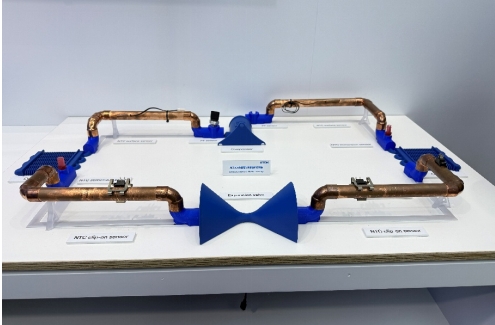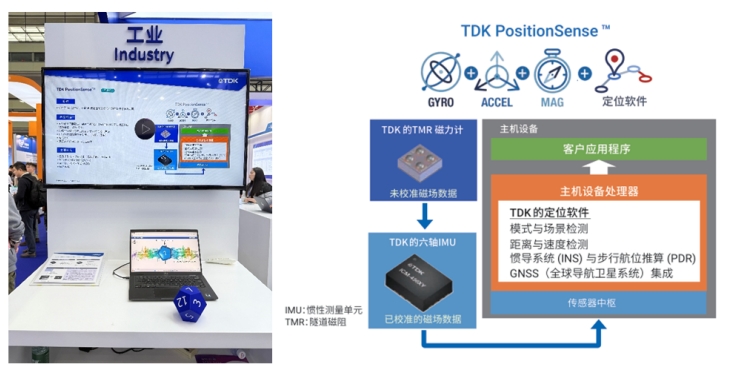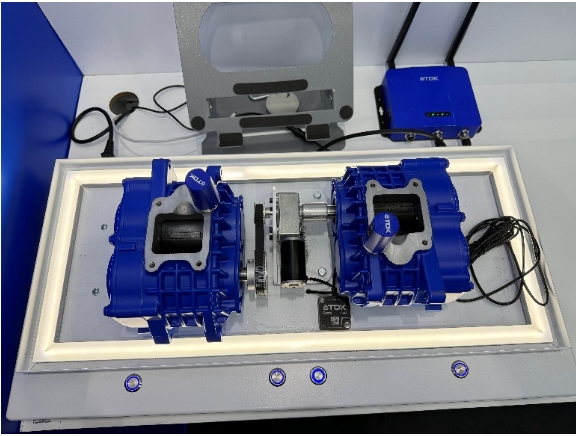Popular Products
PGA4311UA PGA2320IDW TAS3108DCP MAX5440EAG+ INA1651QPWRQ1 DRV134UA DIR9001PW DIT4192IPW ZL38051LDF1 PCM9211PTTDK showcases the development trends of multi-sensor fusion and AI
4/20/2025 11:35:34 PM
TDK automotive chips, industrial chips, sensors, AI
TDK Corporation (Tokyo Stock Exchange Code:) Recently, (6762) made its appearance at the SHENZHEN International SENSOR and Application Technology Exhibition (SENSOR SHENZHEN 2025). Through the display of multi-scenario solutions such as automobiles, industry, and ICT, as well as in-depth sharing at industry forums, it not only demonstrated TDK's profound accumulation in core sensing technologies, It further interprets the latest development trends of multi-sensor fusion systems and the direction of how to combine AI to empower industrial transformation.
Automotive thermal management systems drive the growth of the high-precision temperature sensor market
In the application of new energy vehicles, the thermal management system must not only be able to efficiently cool and heat the core components of the vehicle such as the battery, motor and OBC to ensure they are at the optimal operating temperature, but also work in coordination with the heaters and heat pumps of the air conditioning system to maintain a comfortable interior temperature. The creation of a more efficient and reliable automotive thermal management system has become an urgent need, bringing huge incremental space for related sensor products.
In response to the core demand for energy conservation and efficiency improvement in thermal management systems, TDK showcased an automotive heat pump demonstration system equipped with various high-precision and high-sensitivity temperature sensors, which can meet the requirements of single temperature and integrated temperature and pressure measurement. At the same time, it offers multiple forms such as insert type, sleeve type and snap type for different scenarios. Among them, the insertable temperature sensor can directly contact the refrigerant or liquid, with a fast response time and more accurate measurement. The tubular temperature sensor, on the other hand, is easy to install and eliminates the risk of any refrigerant or cooling water leakage.

Figure 1: TDK showcases an automotive heat pump demonstration system featuring various high-performance temperature sensors
Through process innovation and modular design, TDK has achieved the optimal balance between sensor performance and cost. Liu Wei, a senior manager of TDK Electronics, particularly emphasized: "TDK's P+T temperature and pressure integrated sensor adopts advanced silicon piezoresistive pressure sensors based on MEMS technology and high-precision thermistors, ensuring precise control of the flow of refrigerant and cooling water in the pipeline, thereby achieving more efficient energy utilization." Compared with the ceramic capacitor temperature and pressure integrated sensors on the market, the TDK temperature and pressure integrated sensor is smaller in size and lighter in weight, which conforms to the trend of the automotive industry pursuing lightweight and miniaturization, and has a significant competitive advantage.
Featuring intelligence, integration and low power consumption, new species of industrial sensors are emerging one after another
For industrial applications, TDK also showcased a complete product ecosystem ranging from basic sensors to system solutions. For instance, industrial-grade temperature sensors can cover a wide temperature range from -40℃ to +300℃, support customized cable design and UL certification, and are suitable for scenarios such as solar inverters, energy storage devices and medical equipment.
Meanwhile, TDK has taken the lead in launching PositionSense?, which is used for precise positioning and relative position detection. The sensor subsystem became another major focus of the booth, attracting widespread attention. By designing and placing the TDK low-power 6-axis inertial measurement unit (IMU) and the 3-axis magnetometer based on tunnel magnetoresistance (TMR) according to the corresponding rules respectively, and supplemented by rich on-chip software functions, this system solution of TDK can achieve rapid and precise direction tracking and possess the low-power consumption characteristics emphasized by many target applications.

Figure 2: TDK's latest 9-axis PositionSense? Scheme demonstration system
Zhou Hongji, Senior Director of product marketing at TDK-InvenSense, said, "Traditional sensors are sensitive to environmental factors such as PCB stress, heat sources, and magnetic fields. The innovative PositionSense?" Unlike the traditional integration method of 9-axis sensors within a single chip, two separate chips are used to achieve the function of the 9-axis sensor, enhancing the device's anti-interference ability against environmental changes and significantly improving the flexibility of hardware design. Meanwhile, PositionSense? Its low power consumption feature enables the device to operate continuously and calibrate in real time, providing accurate indication at any time, which can greatly enhance the user experience and is widely applicable to smartphones, high-end wearable devices, drones, robots and gaming devices, etc.
TDK's subsidiary, TDKSensEl, also showcased its newly launched one-stop advanced machine health monitoring platform, edgeRX. By integrating advanced artificial intelligence algorithms, edge computing, and powerful sensor devices, it can directly provide real-time machine health monitoring, predictive maintenance insights, and actionable alerts. As a comprehensive, plug-and-play solution, the miniaturized and cost-effective edgeRX platform does not require extensive setup or dedicated integration. Customers can quickly deploy it, reduce maintenance costs, and enhance overall operational efficiency.
Figure 3: TDKSensEl has launched the advanced machine health monitoring platform edgeRX, which integrates software and hardware
It is also worth mentioning that at this sensor event, TDK showcased the pulse density modulation (PDM) interface digital silicon microphone T5838, which exclusively integrates acoustic activity detection (AAD) functionality. It features a high acoustic overload point of 133 dB SPL, a high signal-to-noise ratio of 68 dBA, and a wide dynamic range. Suitable for applications such as network cameras (battery-powered), voice-controlled TV remote controls, home security smoke alarm monitoring, glass break detection, voice-controlled wearable devices, and voice-controlled home IoT devices, it features an ultra-low power consumption that is 50-70% lower than that of its competitors. Acoustic activity detection is a brand-new ultra-low power edge processing function. MEMS microphones can monitor the acoustic environment in it and wake up the main SoC or application processor from deep powerdown mode when activity is detected, which can maximize the battery life of the system.
In summary, from the efficient thermal management system of new energy vehicles to the predictive operation and maintenance of various industrial equipment empowered by AI, and to enhancing the ultimate experience of a wide range of intelligent terminal devices, TDK is driving the evolution of sensor technology from data collection to intelligent decision-making through innovation-driven development, helping customers in thousands of industries achieve digital transformation and sustainable development goals.
About TDK Corporation
TDK Corporation is headquartered in Tokyo, Japan. It is a global advanced electronics company that provides electronic solutions for an intelligent society. TDK is built on a solid foundation in materials science and has always been at the forefront of technological development. With the slogan "Technology attracts the future", it embraces social changes. The company was founded in 1935 with the aim of commercializing ferrite, a key material used in electronic and magnetic products. TDK's comprehensive and innovation-driven product portfolio encompasses passive components such as ceramic capacitors, aluminum electrolytic capacitors, film capacitors, magnetic products, high-frequency components, piezoelectric and protection devices, as well as sensors and sensor systems (such as temperature and pressure, magnetic and MEMS sensors). In addition, TDK also offers power supply and energy devices, magnetic heads and other products. The product brands include TDK, EPCOS, InvenSense, Micronas, Tronics and TDK-Lambda. TDK focuses on market areas such as automotive, industrial and consumer electronics, as well as information and communication technology. The company has a network of design, manufacturing and sales offices in Asia, Europe, North America and South America. In fiscal year 2024, TDK's total sales reached 14.6 billion US dollars, and it had approximately 101,000 employees worldwide.

- Help you to save your Cost and time.

- Reliable package for your goods.

- Fast Reliable Delivery to save time.

- Quality premium After-sale service.

